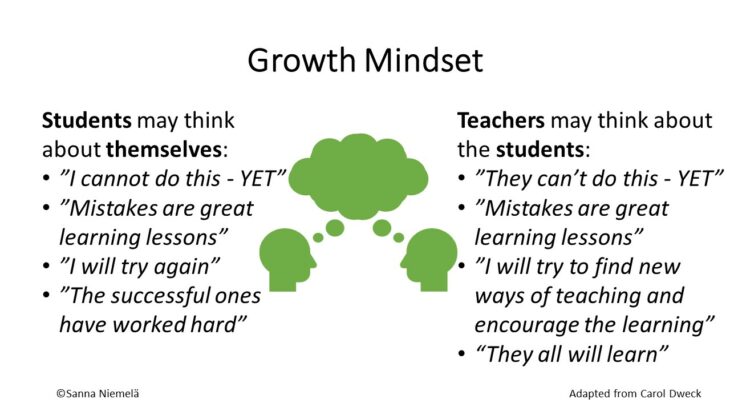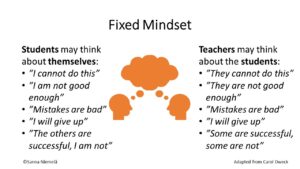
Learning and Growth Mindset
Vol 27, Issue 01, 13 September 2024
When thinking about the most important skill required in life and work, growth mindset is one of the most important ones over the years. The term growth mindset was introduced to the greater public by Carol Dweck in her book Mindset: The New Psychology of Success (2007). She suggests that our mindset has a great impact on our success, and mindset is actually something that we can choose, rather than being something we’re born with. She divides the concept of mindset into two categories: fixed and growth mindset. Let’s dig deeper into these next.
First, let’s define the term fixed mindset. If you have a fixed mindset yourself, you have a belief, that you cannot change or do better, you are naturally bad at something. For instance, you may be holding into a belief that you are so bad at numbers and math so you can’t lean financial accounting. With that belief, you struggle with learning and avoid anything that has to do with numbers, and financial accounting definitely has a lot of numbers! With the fixed mindset, you start avoiding the tasks that you consider challenging for you.

On the other hand, you might have a growth mindset, and you might see things very differently. If you have a growth mindset, you have a belief, that you can grow and learn. It could be that numbers and math hasn’t been your greatest strength, but you’re willing to learn. You know that financial accounting might require more work for you, but you are seeing the course as an opportunity to learn more. You know you might be making some mistakes in the beginning, and it will be hard, but they are just meant for you to learn. No one is an expert in the first accounting course anyway, and after all, the math is pretty simple, just summing up numbers together, and all you have to learn is to know where each data belongs.
Growth mindset is fundamentally about believing that intelligence and skills are changeable and can be developed with effort, whereas fixed mindset is about believing that abilities, intelligence and talents cannot be improved. But if you recognize that you have a fixed mindset instead of growth mindset, what can you do? First of all, increasing your self-awareness will help, so in any given moment you notice yourself talking about “I can’t do that”, you may start continuing that sentence with “I can’t do that… YET”. One more small word, and the whole mindset will change. Secondly, don’t blame yourself if you can’t do that yet. It is a learning process to change the mindset, and it doesn’t change overnight. It requires repetition and perseverance. Thirdly, celebrate the work, so every time you notice that you are making a constant effort, congratulate yourself. Although you might not be there yet, it is important to keep the learning process going on.
As a teacher, I’m also in the process of learning every day, and noticing our own mindsets is very important for teachers, too. The mindset of the teacher impacts on how the student and their learning is perceived. With the fixed mindset, the teacher might believe that some students just cannot learn or improve, and thus give them less time or help in learning. With the growth mindset, the teachers have the patience and know that learning may take more time, and they will find more ways of teaching and supporting the students, encouraging and celebrating the work and progress.
Sanna Niemelä
Senior Lecturer, Xamk Business
- Learning and Growth Mindset - 13th September 2024
- Another successful meeting – IBSEN meets XAMK in Kouvola, May 2024 - 16th May 2024
- Blending and joining the Finnish work life - 8th December 2023
